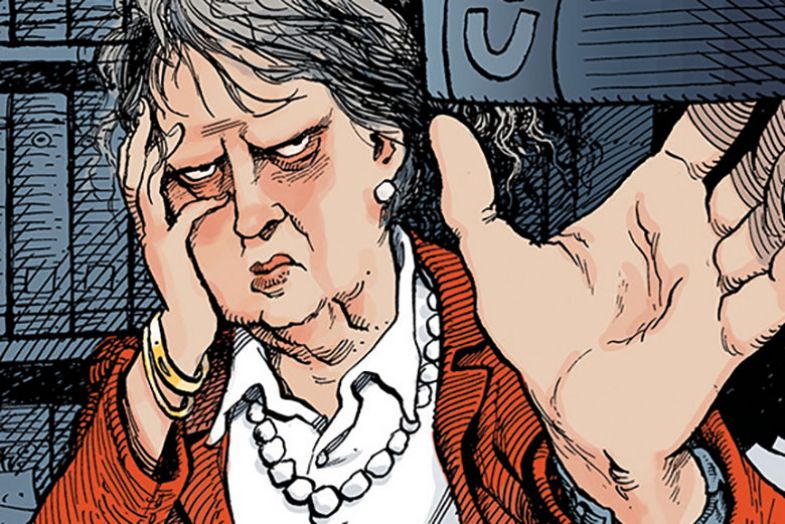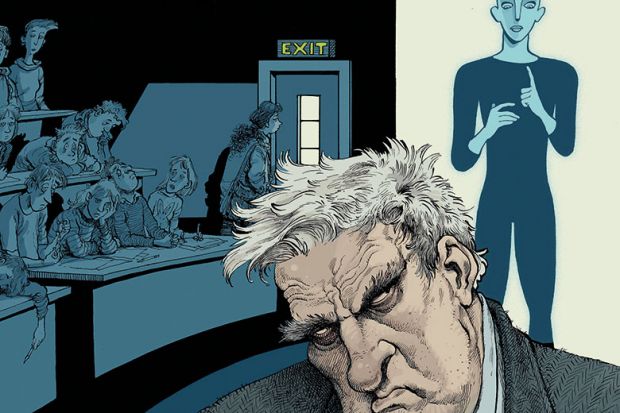“So that is why”, I concluded, to the apparently unimpressed and definitely somnolent audience in front of me, “I believe we need to ensure that fully autonomous artificial intelligence systems are only introduced after obtaining the truly informed consent of society at large. Thank you.”
I glanced up at the clock on the wall of the lecture theatre. Seven minutes to 10. Spot on: just time for questions. But first…Turning to the screen, I addressed the studiedly androgynous avatar standing patiently on its right-hand side. “So, John B, did I miss anything this time?”
It had only been a couple of semesters, but I’d been surprised how quickly I had got used to working with an ASI – an Academic Support Interface. I’d certainly never have believed I’d give it a name based on a rubbish Beach Boys joke (I consider myself “John A”, of course).
The University of Rural England was an early adopter, and, to start with, ASI was really just a development of lecture capture systems. I’d been deeply sceptical about those as well, but ASI turned out to be really useful in making sure all my notes, slides, video and audio from the lecture ended up in the right part of the virtual learning environment. But the upgrades arrived thick and fast.
Simultaneous signing of the lecture was the first big improvement: the sign language users on my course really liked it. For this to work, you needed an avatar – which you could set to be a photo-realistic HD version of yourself if you liked. I stuck with the default, figuring that one edition of me was quite enough for the world to have to cope with.
Gradually, the scope extended to ensuring that I gave the right lecture and flagging any content I missed. Rather than allowing John B to butt in whenever I messed up, I gave it a feedback slot at the end – which was generally a fairly neutral statement that, yes, I’d used all the slides and videos earmarked for the lecture. Until now, that is.
I’d turned back to the console and was already scrolling through my messages in a dismissive sort of way when John B started to speak. “Sadly, John, your lecture this morning does not reach the required standard. Would you like me to expand on this statement?”
John B didn’t sound sad – but was certainly going to by the time I’d finished with it. My lecture may not have been perfect, but I was pretty sure that it was no worse than usual – unlike John B’s attitude. Making a mental note to find which server-rack it resided on and give it a damn good kicking, I managed to splutter “Yes, I bloody would!”
In retrospect, this was probably a mistake. John B listed a catalogue of failings – in beautifully modulated tones that somehow made it worse.
“Overall, your lecture only delivered 73 per cent of the required content. The Standardized Coherence Score was just 3.2, with 18 vague or ambiguous statements. A total of six references were cited that are not present in the currently accepted corpus for the subject, and should be discounted by the audience as unconfirmed sources. This suggests a level of personal bias. In addition...”
“That’s enough!” I yelled, above the amused chuckling and chatter of the class. “End of lecture. Next class is – some time…Heck, I don’t know…Obviously...”
And I stormed out.
My first destination was the coffee machine. My second was the director of teaching. I knocked on her door without breaking step. “Sod off!” Jenny said, before looking up from her screens. “Oh, it’s you – I thought you’d turn up. Is that coffee for me? No? Bastard!”
I offered to share it, but she declined. If anything, I’d say that Jenny was having a worse morning than me. “It’s bloody uproar,” she muttered, waving at her desktop computer while the constant ping of incoming messages rendered an oddly comic counterpoint. “They upgraded the software over the weekend and it has turned on all sorts of features that were buried deep in the AI – until now. Their Big Data portal is now hoovering up a lot more stuff than we thought, apparently – but I guess you found that out...”
The solution seemed obvious. “Why don’t you just reverse the updates and roll back to Friday’s dataset? You wouldn’t lose much.” Jenny slapped her palms flat on the desk. “You thought of that all by yourself, genius? The software team tell me it would take 10 minutes – but they’d need Senate approval...”
“Senate? But you’re the director of teaching – it says so on the door!”
“True – for now, at least. It seems that Senate had a presentation from the AI software supplier last week. They did a hard sell on how this new version would solve all the Senate’s financial problems, plus make them taller and better looking – stuff like that… And don’t bother asking Susan about it because she wasn’t invited. She’s just resigned, by the way, so if you fancy being information services director, now is the time. There isn’t much of a queue...”

The email was waiting for me when I got back to my office clutching a second mug of coffee. I was required to attend a meeting with a representative of human resources at the worryingly precise time of 16.05 that afternoon in Meeting Room CS.01.42. Somehow, I didn’t expect it to be good news – and for the first time in a while, I was right about something.
It was a video meeting, of course. HR learned long ago that bad news is better delivered remotely. The policy has cost them a few screens, but probably saved some broken noses. I vaguely knew Trevor, the character on the other end – I’d been on a couple of selection panels with him – but he didn’t offer me any informality on that account.
“We are here to discuss your academic performance,” he began, before reiterating John B’s comments and adding more extra detail than I care to relate. “Clearly, this is outside the performance parameters defined in your current contract – as amended in March 2019. Your contract will not be renewed at the end of the semester and you will be removed from teaching and administrative duties immediately.”
I was stunned. I had no idea what the contract said, but I was damn sure I had a right of appeal, at least.
“You can, of course, appeal this decision. However, I would warn you that, in such a case, some additional material would become part of your academic record.”
“Such as?”, I muttered, with as much calm as I could muster.
Trevor referred to a paper in front of him. “At 09.00 this morning, the sensors in the console microphone of Lecture Theatre CS.02.01 registered a finding equivalent to a blood alcohol level of 20mg/100ml – which is above the university’s new action level. At the same time, a CBOH value of 7.2 was recorded, which I understand is a record. I’m sure you would not want this more widely known...”
CBOH was “combined body odour and halitosis”. I thought dark thoughts for a moment or two.
“But what about my students? We are only halfway through the course!”
The ghost of a smile crossed Trevor’s face. “The university is currently reviewing all aspects of its teaching policy, with a view to substantially improving provision and reducing costs. The avatar you refer to as ‘John B’ will present the rest of the course – having observed your ‘style’ over the last year. We are confident that the student body will approve. Now, do you accept these findings?”
Left with no obvious option, I nodded – then was asked to vocalise my agreement, for the record. As I did so, the printer in the corner of the room spooled up and began printing a document. My “notice of suspension”. HR, with their love of arcane ritual, insisted on physical media for all really bad news. But, apparently you don’t even get an envelope these days.
I went to the pub. There seemed little else to do. It was crowded for that time of the afternoon, and most of the customers were sullenly reading uniformly printed paperwork. Jenny was already at a table in the far corner. I’d never seen her drink before, yet she had a large whisky in front of her.
“You too…?” I asked.
She nodded and waved her own notice.
“What did they get you on?”
She shook her head glumly. “Poor communication, if you can believe that. This month I apparently responded to 22 per cent of email outside the target time. It looks like they counted stuff arriving at the weekend. Oh – and I apparently told a colleague to sod off, and called him a bastard...”
“It must all be a mistake,” I said, trying desperately to be positive. “A university can’t operate with just a massive AI doing the teaching, reviewing the subject matter and assigning the marks. You can’t just have an HR department running everything!”
A grunt from behind me made me turn around. Trevor, dishevelled and clearly drunk, was leaning unsteadily against the wall, a crumpled document in one fist.
“What makes you think”, he asked in haggard tones, “that HR don’t use avatars?”
John Gilbey is the founder and chronicler of the fictional University of Rural England. He is actively seeking to reduce his CBOH value, which will come as a relief to the worthy folk of the computer science department he teaches in. When not writing speculative fiction, he tweets as @John_Gilbey.
POSTSCRIPT:
Print headline: Inhuman resources
Register to continue
Why register?
- Registration is free and only takes a moment
- Once registered, you can read 3 articles a month
- Sign up for our newsletter
Subscribe
Or subscribe for unlimited access to:
- Unlimited access to news, views, insights & reviews
- Digital editions
- Digital access to THE’s university and college rankings analysis
Already registered or a current subscriber? Login







